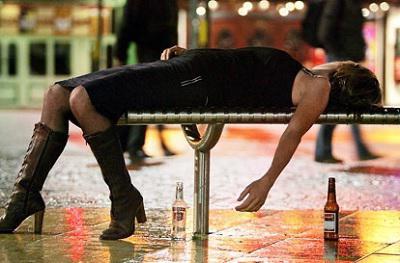Dismissal for drunkenness in the workplace often puts an end to a person’s future career. This is not surprising: being drunk at the enterprise is a gross violation of labor discipline. The article "Dismissals for drunkenness in the workplace" is considered one of the most undesirable. The reason is that employers only in times of acute personnel shortage turn a blind eye to such misconduct in the past. They do not want to hire employees for whom they applied dismissal under the article for drunkenness, since such an entry in the work book better than any characteristics reflects the personal qualities of applicants for the vacancy.

The concept
The term "alcohol intoxication" refers not to jurisprudence, but to medicine. By it, doctors mean a pathological condition characterized by a combination of mental and neurological disorders caused by the action of ethanol - ethyl alcohol - on the central nervous system. Alcohol disrupts the activity of neurotransmitter systems, that is, it dulls attention, memory, reaction, etc., enhances heat transfer, increases the secretion of hydrochloric acid, etc.

The main mistake is haste
As can be seen from the above definition, the concept of “drunk” is not so easy to scientifically formulate. It follows that often employers also make a mistake by applying a sanction - dismissal for drunkenness in the workplace - to the violator of labor discipline. Indeed, there are often cases when workers come to the enterprises of a fuss. However, its signs - smell, uneven walking, speech incoherence, etc. - will not yet prove in court that the person was really intoxicated. Hasty conclusions sometimes end with rude miscalculations of directors who decided to dismiss an employee immediately.

“I tried kvask”
A significant case occurred with Russian President VV Putin on the Straight Line. Shortly before his speech to the head of state, one of the journalists suffered a stroke, which is accompanied by a postsyndrome - speech incoherence. Therefore, it seemed to everyone, including the president himself, that the journalist was intoxicated. The question was about Vyatka kvass, so V.V. Putin tried to defuse the situation by joking that the journalist had already “tried kvask”, hinting at his condition. After all the circumstances were clarified, the president personally apologized to the journalist for an inappropriate joke. By the way, after this story, Vyatka kvass was seriously entrenched in the shelves of almost all major Russian supermarkets.
This story makes it clear that there is no need to draw hasty conclusions, accusing the person of being drunk.

Statistics
Recent statistics tell us that the dismissal of an employee for drunkenness in the workplace is a rare occurrence. However, this does not mean that Russia has a very strict labor discipline. On the contrary, the appearance of employees at work tipsy is recorded quite often. Many employers even get used to the fact that some workers “drink slightly” or appear with unpleasant odors from alcohol. Later we will talk about what consequences directors can expect for such inaction and closing their eyes. Why are employees rarely sanctioned - the dismissal of an employee for drunkenness in the workplace? There are several reasons:
- "Personnel hunger."The shortage of employees often leads to the fact that employers "do not notice" tipsy in the workplace.
- Professional qualities of the employee. In some situations, dismissal for drunkenness at the workplace of the offender leads to significant economic losses for the company.
- Personal qualities of the employee. Some collectives have the soul of the company, or a link ”, and the loss of one ordinary locksmith, for example, can lead to bankruptcy of the enterprise. This is not a myth at all, but an iron rule of collective psychology.
- The humanity of the director. Dismissal for drunkenness in the workplace is the future cross in his future career. With such an entry in the work book, it is difficult to find a job in the future. Many employers are well aware of this, and dismiss "on a humane basis" - dismissal on the initiative of an employee (of their own free will).
- Paper and judicial red tape. Also, many employees understand that the article “Dismissals for drunkenness in the workplace” leaves them out of modern life. Therefore, almost always the employees dismissed by her, in court, try to change the wording of the entry in the work book. Courts, as a rule, take the side of the employer, and do not always support violators of labor discipline. However, often employers themselves violate formal procedures for dismissal, which leads to their losses in the courts. The latter circumstance also forces the directors to agree with the guilty employees to disperse peacefully, etc.

Dismissal for drunkenness: article of the Labor Code of the Russian Federation
“Dismissed for drunkenness” - in fact, such a wording in the legislation does not exist. However, a similar article still exists in the Labor Code of the Russian Federation. What is this legal norm?
"Dismissal for drunkenness" - an article of the Labor Code (clause 6, part 1, article 81) - officially sounds like this: the appearance of an employee at his workplace in a state of toxic, alcoholic or drug intoxication. For revealing the misconduct stipulated by this article, the employee may be dismissed as soon as his condition is finally confirmed by the employer. There can be no paid remuneration for 2 weeks, an initial reprimand, or a warning - only dismissal.
Place circumstances
The employee can be fired according to the above article only if he appears drunk at the workplace. The appearance of him during working hours while intoxicated, say, in another place, will not be the basis for applying sanctions to him, provided specifically for in par. 6 of Part 1 of Art. 81 of the Labor Code of the Russian Federation. There are other legal provisions for this. However, one of the employer's main mistakes is the misapplication and interpretation of laws.

What does “work” mean?
What is work? It would seem that absolutely anyone in their right mind can answer this question. However, in jurisprudence, the term “work” means:
- direct place of performance of duties;
- territory outside the workplace, but controlled by the employer;
- the facility where the employee is working on behalf of his boss.
Those. in legal norms, the term “work” does not mean job duties, but the place where the employee performs them. We give an example that will help to understand how to properly interpret this rule of law. Suppose a person performed his duties before lunch, after which he left work in the dining room for a break. There he drank pretty and was drunk and went home, after which he no longer appeared at the workplace. The employee himself admitted that, indeed, he was drunk, so he could no longer continue to carry out his duties. Is it possible to dismiss an employee for drunkenness in this case? The correct answer is no, because, despite working hours, the employee did not appear at the workplace while intoxicated.Moreover, if less than four hours remained before the end of his working time, then it would also be unlawful to apply sanction for absenteeism.
Circumstance of time
The second important circumstance is time: was it a worker? Sometimes in judicial practice there are situations when an employee is intoxicated at his workplace, but his working time is over. It is logical to assume that in his working time he was in the same condition. However, the courts do not take this argument into account by employers.
A drunken employee can be detained at the control point until the beginning of the working day. In this case, dismissal for drunkenness will also be illegal. Drinking to work on their day off or holiday also does not serve as the basis for dismissal under the aforementioned article, although such cases practically do not occur.
Business trips
There are questions about whether it is legal to dismiss an employee on a business trip if he drank alcohol during the trip: on a train, bus, plane, etc. On the one hand, the employer pays for the entire trip, so it’s logical to assume that sanction is possible. On the other hand, it has not yet reached the immediate fulfillment of duties. Courts interpret this situation unambiguously: the cabin of an airplane, train compartment, etc. cannot be assigned to the workplace, and the trip time to working time.
Fixing the fact of intoxication
The most effective way to detect the fact of intoxication is a medical examination. After it, it is practically impossible to reinstate oneself if the employer still decides to dismiss the violator of labor discipline under the relevant article of the Labor Code. But what if the medical examination fails for objective reasons, for example, on a day off when hospitals are closed? Yes, and the employee himself is not at all obliged to go through it, however such a position of the violator will not allow avoiding sanction with the correct sequence of dismissal.

The Plenum of the Supreme Court of the Russian Federation indicated that a state of intoxication can be confirmed not only by a medical report, but also by other means. The first stage of dismissal for drunkenness is fixing the fact by creating a commission, which should draw up an act. Experienced lawyers know that it must be drawn up regardless of whether the employee agreed to be examined or not, as the person has the right to “turn on the back” at any time and refuse right at the doctor’s doorstep. Drawing up an act on the appearance of a worker in a drunken state the next day or retroactively will be illegal. The employer’s chances of winning in court, in the event of a labor dispute about the lawfulness of dismissal, increase if there is different evidence - acts, reports, reports, testimonies of witnesses, etc.
Drawing up an act on the violator of labor discipline
It is recommended to draw up an act on a drunk employee as early as possible. There is no approved form for its compilation, but it is advisable to include the following information in it:
- information about the employee for whom the act is drawn up;
- information about the commission composing the act;
- date, time and place of drawing up the act;
- signs that indicate a state of intoxication.
Signs of intoxication
Of course, one can always say that the employee was “slandered”, “attributed” to him signs that do not indicate that the person came to work in a state of intoxication, etc. In order to avoid contentious situations, the Ministry of Health of the Russian Federation approved signs in his order, according to which the employer may suspect the employee of intoxication:
- speech impairment;
- a sharp change in complexion;
- unnatural gait;
- unpleasant smell of alcohol.
The above signs should be indicated in the act, if any.
Employer Responsibility
An employer who decides to turn a blind eye to the appearance of an employee in a state of intoxication or another type of intoxication must understand that he may be liable. A person under the influence of alcohol is not able to completely control the situation. Often drunk people become a source of increased danger, both for themselves and for others. The legislation provides sanctions to the employer for intentional inaction in relation to a drunk employee. In other words, if the director knew, or suspected that the employee had come to work, but did nothing to remove him from work, he could be punished for his inaction, including criminal liability. Responsible persons who have not removed the violator of labor discipline from the performance of their duties can be punished for violation of labor protection rules - as in Art. 5.27.1 Administrative Code, and according to Article. 143 of the Criminal Code. They can also indemnify for possible negative consequences: property damage, personal injury, moral damage from insults, sexual harassment, etc.

Some managers do not know what to do in a situation where the employee, in their opinion, came to the company while intoxicated. On the one hand, they can get negative sanctions for the actions of such an employee. On the other hand, there is no need to rush things, and immediately dismiss the employee for drunkenness. What to do in a similar situation? Next, we will analyze the order of dismissal for drunkenness.
The order of dismissal
So, if an employee grossly violated labor discipline and came to work drunk, the actions of the employer to dismiss him will be in the following sequence:
- Fix violation.
- Issuing an order to remove an employee from performing official duties until all circumstances are clarified.
- Drawing up an act.
- Issuing an order for a medical examination.
- Issuing an order to provide an employee with an explanatory note in case of confirmation of intoxication.
- Drawing up an act of refusal to provide an explanatory note - if the violator refused to give any written explanations
- The publication of the order of dismissal - there is no special example of the order of dismissal for drunkenness.
- Refusal from painting upon familiarization with the order if the violator refused to put his signature on it.
All other actions will be the same as in other circumstances of dismissal.
Proportionality of punishment
Do not forget that dismissal is an extreme measure for labor misconduct. The presence of evidence that a person came to work while intoxicated is not yet the basis for applying such a severe punishment to an employee. Courts often overturn decisions of leaders and replace the wording of dismissal. The motivation of the court may be as follows:
- The employee has long been performing his duties at the enterprise.
- Pre-retirement age of the employee.
- The absence of negative consequences for the employer from misconduct.
- The employee had no disciplinary action previously.
Summing up the material, we say that you should not rush to dismiss a person according to the "bad" article of the Labor Code. Perhaps the future fate of the employee from such actions may not be for the better. Therefore, you should first try to resolve the issue peacefully, without creating unnecessary problems for both sides.